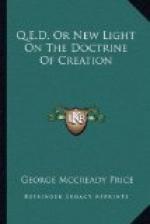The term mutation, as already intimated, has been given to this process of producing new varieties in this way. The kinds so produced are termed mutants, and at first they were hailed by enthusiastic scientists as “elementary species.” De Vries in particular gave much publicity to this idea; for he thought he had really produced a new kind comparable in every respect to a true species as produced by nature among wild plants. But the enthusiasm with which this applied result of Mendel’s Law was at first hailed by biologists has gradually subsided; for it has been found that though these new forms will breed true under certain conditions, they are nevertheless cross-fertile with the original forms, and thus the circle can be completed back again by a return to the parent form, from which the new “species” can again be produced at will with the same mathematical exactness as before.
III
Where then are we?
Clearly we have not really produced any new species in any correct sense of the word. If we have produced new forms that breed true and that are seemingly just as deserving of the rank of distinct species as many now listed in scientific books, it only shows that our lists are sadly at fault, and that they are not all species that are called species. These experiments merely indicate that the parent form possesses more potential characters than it can give expression to in a single individual form, some of them being necessarily latent or hidden, and that when these latent ones show themselves they must do so at the expense of others which become latent or hidden in their turn. This vital elasticity, as it may be termed, or the vital rebound under definite conditions, is indeed a prime characteristic of the species just as it is of the individual; but like that of the individual the vital elasticity of the species is strictly bounded by comparatively narrow limits beyond which we have never seen a single type pass under either natural or artificial conditions. Mutations can be made according to Mendel’s Law; but when we have made them once we can always be sure of producing the very same mutants again in the very same way, as surely as we produce a definite chemical compound; and when we have made it we can always resolve it at will back into its original form, just as we can a chemical compound. And so, where is the evolution? or how do these facts throw any light on the problem of the origin of species, any more than chemical compounds throw light on the origin of the elements? Obviously in biology as in chemistry we are only working in a circle, merely marking time.




